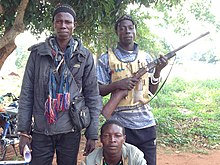Anti-balaka
As anti-Balaka referred to armed forces in the Central African Republic , the end of 2013 during the Central African civil war as a kind of "village self-defense" in opposition to the forces from the Muslim-dominated Seleka came -Milizenbündnis in appearance and mostly Christian former President François Supported Bozizé . In 2009 they had organized themselves to defend themselves against highwaymen and bandits in the country. The Anti-Balaka now consist of 60,000–70,000 men, half of whom are active in the capital Bangui . They have deadly confrontations with the forces of the former Séléka alliance. The disputes between Anti-Balaka and Séléka are interpreted in the public discourse in relation to dominant religions (Anti-Balaka as Christian, Séléka as Muslim).
history
The Séléka militia alliance comes from the north of the country, where the Central African Republic borders on Chad and Sudan and where the majority is Muslim. In March 2013 it took the capital Bangui , whereupon the President François Bozizé fled. One of the leaders of Séléka, Michel Djotodia, declared himself president and tried to disband the militia. However, many of the rebels refused to disarm and the country was heavily looted by the undissolved militias. As a result, international peacekeeping forces were formed in the country , with the participation of the French army . In the course of 2014, German soldiers are also to be deployed on a peacekeeping mission. Bangui is located in the predominantly Christian south of the country.
A report from February 2014 estimates that the Séléka are retreating towards the north of the country and are being attacked by anti-Balaka people en route. The approximately 5000 soldiers of the African Union (MISCA) and the approximately 1600 French soldiers concentrate on the capital.
On February 12, 2014, Amnesty International assessed that the anti-balaka are practicing a form of ethnic cleansing against the Muslim population.
etymology
The word "Balaka" means "machete" in the Sango language, i. H. Anti-balaka can be translated as anti-machete. Another interpretation is the derivation as "Anti-balles AK" based on the French, which can be translated as "Against the bullets from an AK", alluding to the AK-47 assault rifle . In both cases it is about the belief that one is protected against enemy weapons by a corresponding spell .
See also
List of terrorist attacks in the Central African Republic
Individual evidence
- ↑ 'Hundreds dead' in Central African Republic violence , BBC, December 6, 2013
- ↑ a b IRIN Briefing: How are the anti-balaka of CAR , IRIN, February 12, 2014, accessed June 16, 2014
- ↑ Unspeakable horrors in a country on the verge of genocide , Guardian, November 22, 2013
- ^ Von der Leyen: No Combat Operation in Central Africa , FAZ Online, February 11, 2014
- ↑ Central African Republic: Violence in the villages continues Deutsche Welle Online, February 4, 2014
- ^ Amnesty International: Central African Republic: Ethnic cleansing and sectarian killings
Web links
- Planned EU mission is not enough for Central Africans Deutsche Welle Online, January 30, 2014
- Who Are the Anti-Balaka of the CAR? , Voice of America , Feb. 7, 2014
- Central African Republic: Human flesh at the weekly market , FAZ Online, March 8, 2014
